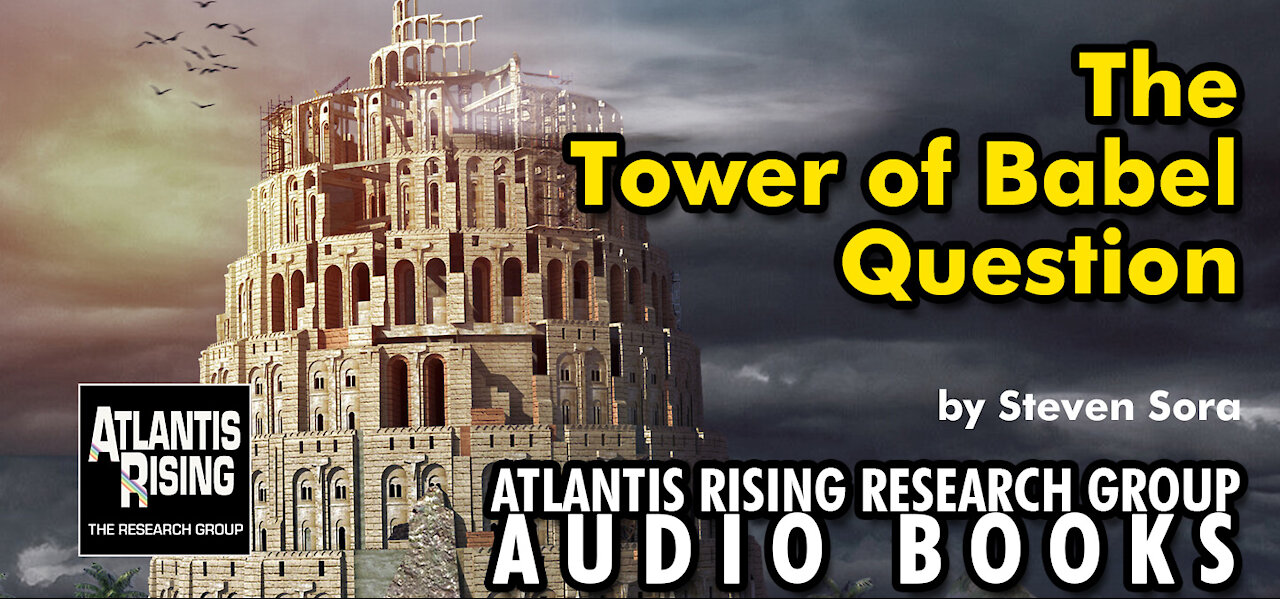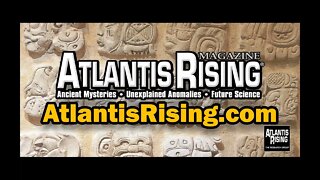Premium Only Content

The Tower of Babel Question - Atlantis Rising Magazine
Visit Atlantis Rising Research Group at https://www.atlantisrising.com/
One of the earliest Bible stories is that of the Tower of Babel. In Genesis 11 we read, “And the Earth was of one tongue, and of the same speech.” The people of Babel decided to build a tower so high that they could reach heaven. God said in Genesis 11:7, “Let us go down and there confound their tongue.” After which, “the language of the whole Earth was confounded.”
Stories from the Bible can’t, in many cases, be taken literally. They do, however, often reflect real historical events, although not to any exact standards. Some, like underwater archaeologist Robert Ballard, say evidence of the great flood can be found in the fact that the Black Sea was once a lake. The Mediterranean Sea was also, at one point in time, not connected to the Atlantic. Islands in that sea, like Malta and Sicily, only became islands after the sea level of the Earth rose. The Sumerians told similar tales, and they also included impossible features, as they were intended to convey a moral tale.
The story of Babylon’s tower was originally described in a Sumerian text and is depicted on a stele dating to 2300 BC. The Bible may have intended to tell a cautionary moral tale, but the Sumerians may have described a real event. Massive floods, drought, and any number of catastrophes could have broken up a worldwide civilization whose peoples then fled by foot and ship.
A Universal Language?
Could the Earth have shared a language that only later became divided into numerous languages? Evidence for this may be found in the extended number of shared words that exist around the globe.
Greetings today often involve a reference to God. Vaya con Dios is Spanish for “Go with God.” ‘Namaste’ loosely means “I recognize the God within you.” At the time of the biblical story of Babylon, Eloah was the name of God, a name from which Allah, the God of Islam, is derived. In Greece “Haloa” was the name of an annual festival to all the gods including Dionysius. “Heloha” was the thunderbird of the Choctaw tribe. The earliest greeting we know in the English language is “Halloa” which became “hello.” It was commonly used in Arthur Conan Doyle’s Sherlock Holmes. The name may have spread as far as Hawaii where “Aloha” is the greeting.
The Bible tells us that the Jews wandered in the desert for forty years. In times of near starvation, Manna was a gift from God that sustained his people. In Hawaii and Tahiti the word Mana can refer to a form of spiritual energy and healing power. This spiritual quality has a supernatural origin. In New Zealand the Maori culture has a similar meaning to the Hawaiian concept. It is believed one can gain or lose Mana through one’s actions. North American tribes share a nearly identical concept. Mana (or Manna) was spiritual nourishment. The Great Spirit of these tribes is Manito who sent Manabozho to Earth to bring culture. Manabozho was a white man like Ireland’s hero Manannan mac Lir. In Ireland, England, and Wales he is regarded as a God of the Sea. Could it have been this culture hero who brought civilization to North America? He may have landed in Mannahatta, which became Manhattan. With a slight vowel change, Mona was the center of Druid power. This spiritual nourishment was also physical nourishment. It became a substitute name for the Christian Eucharist host.
Mana/Manna may not be the only Hebrew/Hawaiian connection. The Hebrew word for priest is Kohen, and it is a family name as Kahane. In Hawaii a kahuna is a medicine man or priest. He may be a powerful man as well, as in Big Kahuna. There are some who believe Hawaiians were part of the lost tribes of Israel. The number of customs of the Hawaiians corresponding to Hebrew practices is large and includes circumcision, offering of first-fruits to the gods, and the custom of chiefs washing their hands at meals. The Hawaiians share a story of a man swallowed by a sea creature who survived, a deluge where man saved the animals, like Noah, and others.
In the event of this early Diaspora, the Hebrews might have been responsible for carrying their name far and wide. They may have called themselves after the five times great-grandfather of Abraham, Eber. Going west the Semite peoples crossed Iberia (now Spain and Portugal). The Romans called the Iberian Peninsula Hispania, but its original name meant “the crossing.” The Ebro River remains on the map today. Their destination might have been the modern day Ireland recorded as Hibernia and the Hebrides of Scotland’s west coast. The city of York was then named until the Norman invasion. Literally hundreds of place names exist or existed in Europe, including the Kingdom of Iberia in Georgia.
-
 0:19
0:19
Atlantis Rising Research Group
2 years agoJoin the ATLANTIS RISING RESEARCH GROUP!
1.12K1 -
 23:22
23:22
MYLUNCHBREAK CHANNEL PAGE
2 days agoUnder The Necropolis - Pt 5
210K71 -
 54:05
54:05
TheGetCanceledPodcast
1 day ago $14.91 earnedThe GCP Ep.11 | Smack White Talks Smack DVD Vs WorldStar, Battle Rap, Universal Hood Pass & More...
202K35 -
 8:30
8:30
Game On!
20 hours ago $0.91 earnedLakers BLOCKBUSTER trade! Luka Doncic is coming to LA!
32.3K4 -
 48:29
48:29
hickok45
1 day agoSunday Shoot-a-Round # 266
30.7K10 -
 15:18
15:18
SternAmerican
3 days agoStern American with Sam Anthony from YourNews.com
21.3K1 -
 1:03:13
1:03:13
PMG
1 day ago $1.97 earnedRFK, Tulsi & Kash Hearings, the Plane Crash in the Potomic, & Ozempic
19.2K3 -
 11:33
11:33
DeVory Darkins
1 day ago $23.60 earnedJustin Trudeau PANICS after Trump slaps Canada with AGGRESSIVE Tariffs
120K273 -
 19:11
19:11
Stephen Gardner
1 day ago🔥HOLY CRAP! Chuck Schumer UNDER INVESTIGATION | 3 HUGE Trump MOVES explained!
130K340 -
 4:53:35
4:53:35
Rotella Games
21 hours agoGrand Theft America - GTA IV | Day 4
89K5